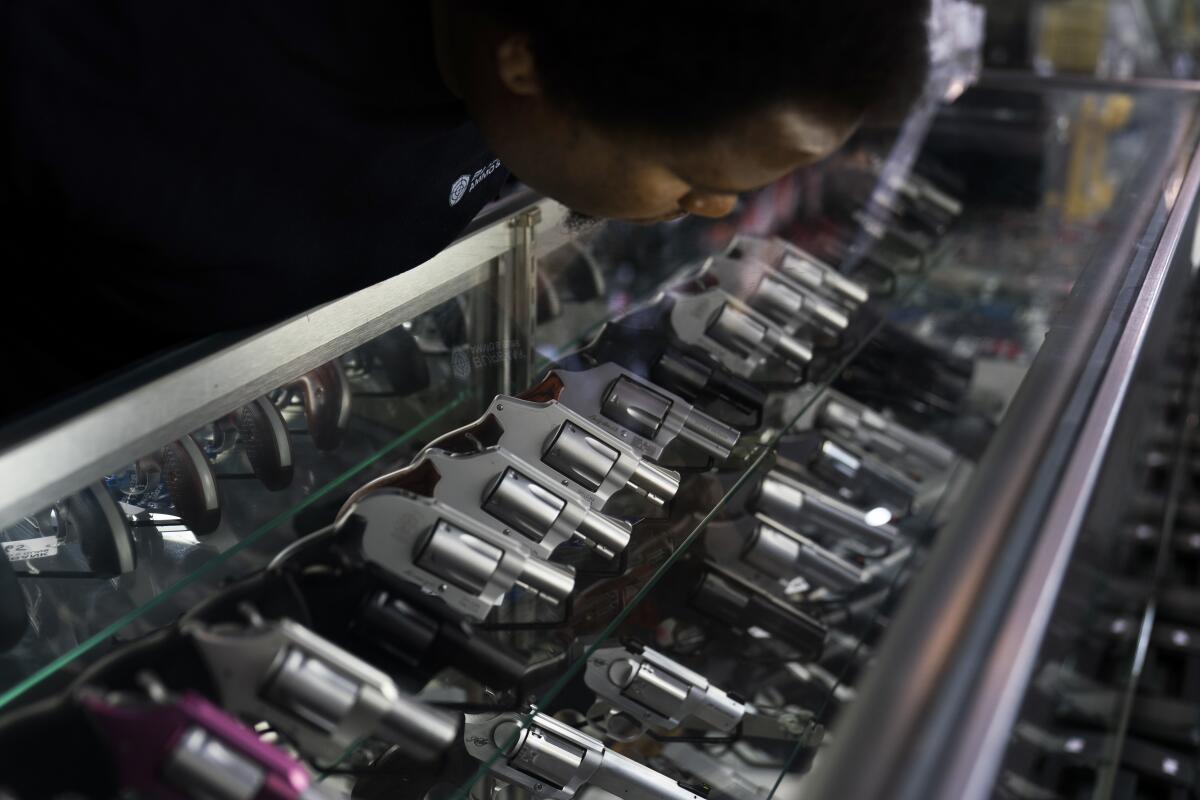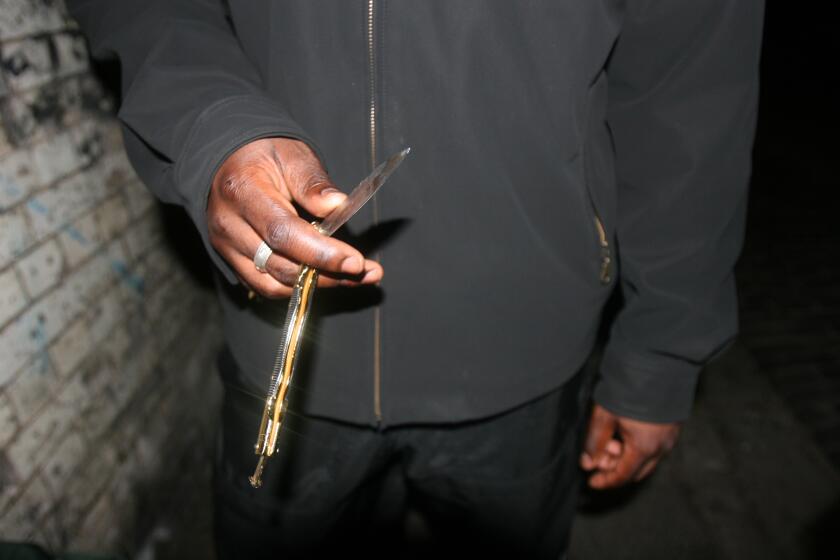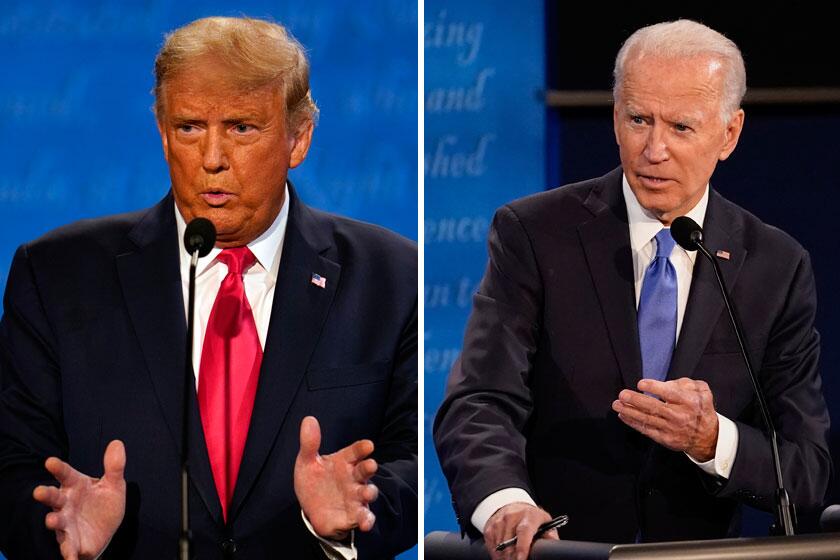California law removing guns from people under restraining orders survives court challenge

- Share via
A California law that bars people who are under restraining orders from possessing firearms survived a federal court challenge on procedural grounds Thursday, marking a win for gun control advocates.
A split panel of the U.S. 9th Circuit Court of Appeals ruled 2 to 1 that Huntington Beach couple Miranda and Richard Wallingford’s challenge to California’s law was moot — or no longer legally viable — because the restraining order at the heart of their case had lapsed and they are no longer barred from possessing guns.
The decision leaves California’s law intact at a time when other state weapons laws are being dismantled — including by the 9th Circuit — in the wake of a U.S. Supreme Court decision last year that upended 2nd Amendment jurisprudence nationwide.
The Supreme Court’s overturning of a New York law restricting people’s right to carry firearms in public has reinvigorated a legal war on California’s gun laws.
Alexander Frank, an attorney for the Wallingfords, said he and his clients were disheartened that the court had avoided the couple’s underlying claim that their “fundamental liberties” under the 2nd Amendment right to bear arms were being violated by the state.
“Obviously we’re disappointed that the 9th Circuit decided to punt it on mootness,” Frank said. “It’s a rights issue that goes beyond the parties in the case.”
California Atty. Gen. Rob Bonta’s office, which had been defending the state in the case, said in a statement that it was pleased with the decision.
“California’s gun safety laws save lives and protect our communities,” it said. “We remain committed to defending these constitutional laws on behalf of the people of California.”
The Wallingfords have had a tense relationship with their neighbor Jessica Nguyen for years, and the neighbors have filed dueling harassment allegations in Orange County courts. Restraining orders were issued against both parties in 2019, and the Wallingfords had to give up their firearms as a result — prompting their lawsuit.
The Wallingfords had argued that the state law was unconstitutional because it stripped them of their 2nd Amendment rights without any requirement that they be shown to be a danger. They didn’t argue that no one under a restraining order should have to give up weapons, but that the state law sets too low a bar for such restrictions.
During arguments in the 9th Circuit case last year, Frank argued that the couple’s position was made stronger by the Supreme Court decision in New York State Rifle & Pistol Assn. vs. Bruen. In that decision, the high court ruled that restrictions on firearms are unconstitutional unless they are deeply rooted in early American history or sufficiently analogous to some historical rule.
The 9th Circuit and other courts in the country have struck down a number of weapons laws since the Bruen decision. Several cases challenging major California gun laws — such as the state’s bans on assault weapons and large-capacity magazines — are pending.
But Thursday’s decision, which divided the panel’s two conservative judges, didn’t touch on Bruen at all.
In the court’s majority opinion, Circuit Judge Mark J. Bennett — a Trump appointee — wrote that the court did not “discount the harm the Wallingfords appear to have suffered.”
A federal court ruled Hawaii’s 30-year ban on butterfly knives is unconstitutional under the U.S. Supreme Court’s new “history and tradition” standard.
However, there are strict legal requirements that must be met for a legal case to proceed even after an alleged harm has stopped occurring, Bennett wrote, and the Wallingfords had not shown that their case met those requirements.
Bennett was joined by Judge Elizabeth E. Foote, a U.S. District Court judge and Obama appointee who had been specially assigned to the case.
Circuit Judge Daniel P. Collins, another Trump appointee, dissented, saying the Wallingfords’ case should have been allowed to proceed because Nguyen has filed for multiple restraining orders against the couple, and it is plausible for the couple to believe she will do so again.
Collins also seemed to question the constitutionality of California’s law, writing that it was reasonable to conclude from the record that state courts issue restraining orders that strip people’s gun rights “without findings that would be sufficient to support an automatic deprivation of Second Amendment rights.”
Frank said he and his clients are determining whether to appeal the decision.
President Biden has appointed six judges to the U.S. 9th Circuit Court of Appeals and has two more on the way, but hasn’t matched Trump’s impact on the court.
Adam Winkler, a UCLA law professor who focuses on 2nd Amendment law, said the ruling shines little light on the 9th Circuit’s posture on gun cases, given that it was decided solely on procedural grounds.
But the outcome may well have been different if the court had taken up the 2nd Amendment claims directly, he said, given that the traditionally liberal 9th Circuit has “been turning increasingly anti-gun-control” since President Trump appointed 10 judges to the court — which has 29 full-time members — and the Bruen decision landed.
More to Read
Sign up for Essential California
The most important California stories and recommendations in your inbox every morning.
You may occasionally receive promotional content from the Los Angeles Times.














